‘You’ve got to challenge homophobia’: Zack Leader tells FvH Podcast about abuse incident he faced in amateur football
On a new episode of the Football v Homophobia Podcast, Zack Leader – whose coming out story in sport made headlines back in 2018 – discusses how anti-LGBTQ+ discrimination in a local league game in January affected his mental health and describes the disciplinary process that ensued…
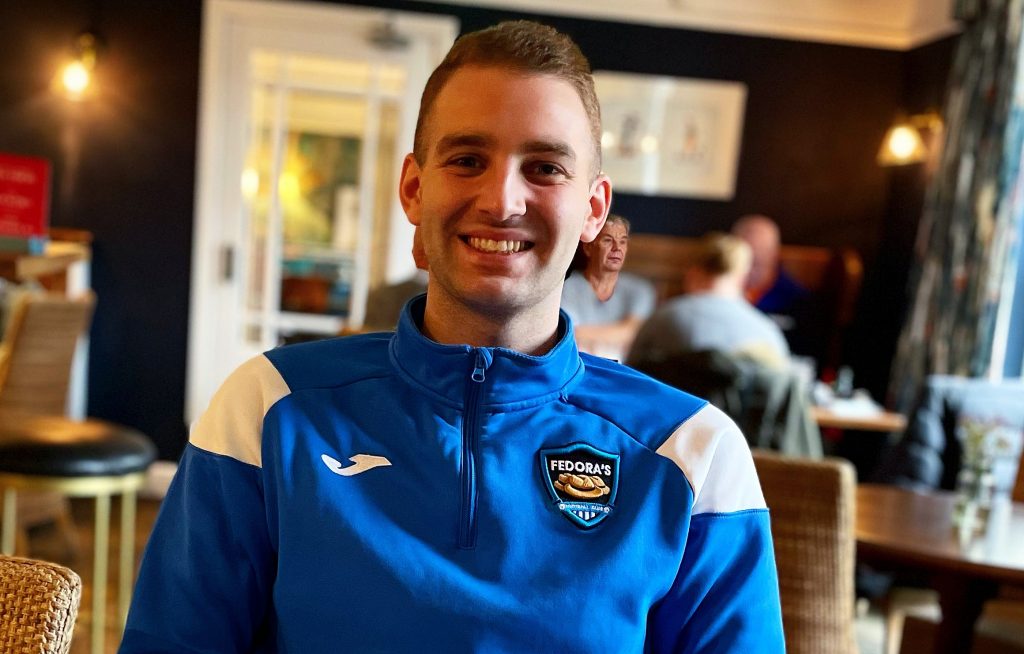
Zack Leader loves leading the line for his club side in a local league affiliated to the Lincolnshire FA.
He chipped in with enough goals to take away a top scorer trophy from the 2021/22 season – but there was also an incident of anti-LGBTQ+ abuse during the campaign that ended up chipping away at his self-confidence, as he explains on a new episode of the Football v Homophobia Podcast.
Zack was previously a British junior champion in gravity bike racing, taking those titles in 2016 and 2017 in what is an all-downhill, high-speed discipline.
Back in January 2018, when he was aged 19, he put up a coming-out post on his Instagram, writing that it was a personal decision to do so and one that he hoped might help other people in motorsport who are LGBTQ+.
His story was subsequently picked up by local media and then shared more widely by Outsports, Gay Times, and several other LGBTQ+ media outlets. He was even nominated alongside Nicola Adams and Gus Kenworthy in the 2019 British LGBT Awards Sports Personality category.
He was runner-up twice at senior level in the British Championship and went on to finish fourth at the 2019 World Championship in Italy. However, he gradually “lost the passion” for gravity bikes and after the pandemic thwarted his 2020 plans to race, he announced in January 2021 that he was giving up the sport.
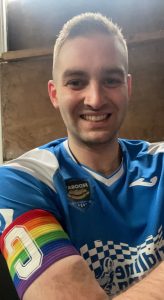
By this time, he had rediscovered his love for football and was playing for an amateur Sunday league team in Lincolnshire where he lives. His memories of playing the game at school had mostly been unhappy ones due to bullying, but returning to football as an out gay man, he found the environment at the club he joined to be welcoming.
“There was no having to come out,” he tells the FvH Podcast. “People naturally found out through social media anyway, and I didn’t go to the point of hiding it because there was no need.
“There was a bit of football banter and jokiness and I didn’t mind that – it added to the feeling of being accepted and part of the team.”
His experiences at his club continued to be largely positive but by summer 2021, Zack felt it was the right time to move on. “I didn’t feel it was an entirely positive environment for me – I just needed a new start,” he explains.
He switched to Fedora’s FC, turning out for their reserve team in the third tier of the Gainsborough & District Sunday Football League – and was very happy with the decision he had made.
However, his old club were in the same division as Fedora’s reserves for the 2021/22 season and there was a degree of disgruntlement from them about Zack’s departure. “There was a little negativity around me leaving – the ‘traitor’ remarks, and ‘you’re not welcome back here’ and all this sort of thing. I don’t really understand that but unfortunately, that’s just the way it is.”
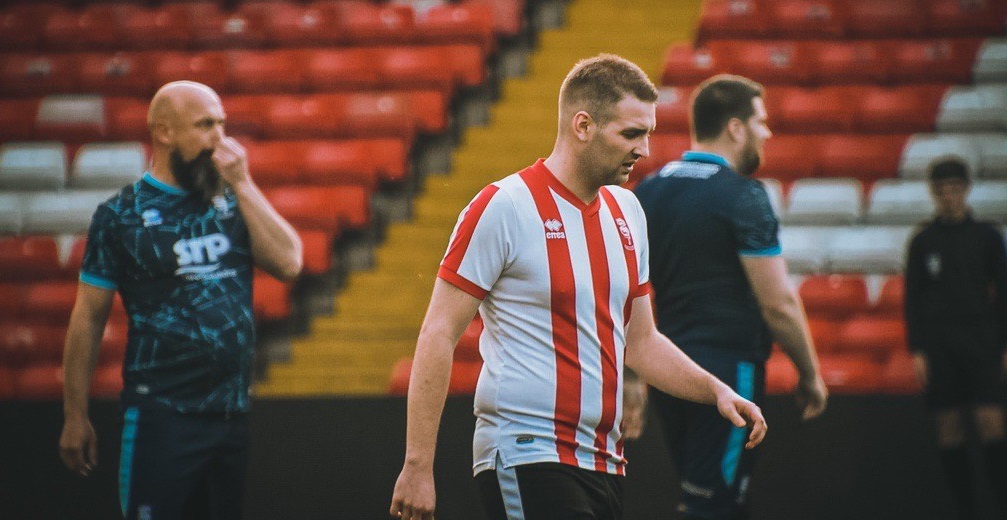
The two teams played each other in pre-season, then met in both league and cup before Fedora’s reserves were the hosts for the reverse league fixture in January 2022. Zack started the match up front.
“There’d been no issues at all in those previous games,” says Zack. “Fifteen, 20 minutes into the game in January, and I’m chasing the ball down to try and win it back from their centre-back, and I heard a comment from the sideline.”
Zack explains it was the type of comment where he had to do “a double take” but he was sure that what he had heard was homophobic.
“Somebody had shouted ‘gay c**t’. It’s not the worst thing that’s ever been shouted from the sideline. But it was absolutely clear as day.
“I had to stop myself from the natural human reaction. I went straight to the referee and reported it, and he dealt with it in the way that he did. In all fairness, he did everything by the book.”
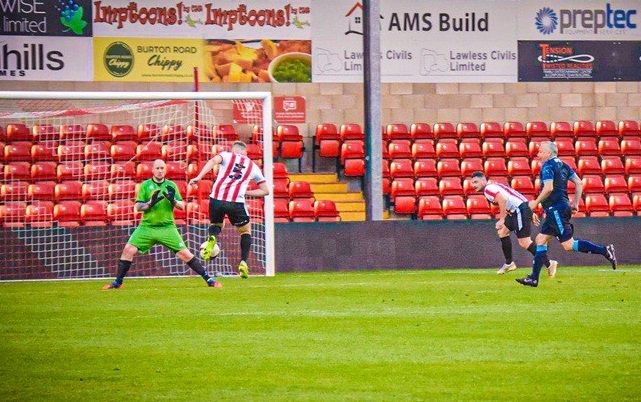
On the podcast, Zack talks through how the incident made him feel. He certainly hadn’t expected to receive discriminatory abuse while playing against his old club, where he had felt accepted. He was confident though that he had done the right thing in reporting the abusive comment to the referee – and he was backed up by team-mates who had also heard what had been shouted. In mentioning the comment to the match official, it set off a chain of events that were out of his control.
“I made a very conscious effort just to walk away from it and let others deal with it,” he says. “My mum, my stepdad and my three-year-old niece were there. I didn’t want them to have to witness that. I think they could see what was building so they walked off.
“You can’t prepare for having to deal with that sort of situation. You have to be rational about what you do, because the way you react can shape the whole story.”
With the incident going into the referee’s report, and reactions to it already spilling onto social media after the final whistle, Fedora’s FC put out a statement condoning “completely unacceptable behaviour” and pledging to work with the Lincolnshire FA on the ensuing investigation.
On the podcast, Zack reflects on what that process looked like, and the hearing held via Zoom in March that led to a verdict on the basis of evidence and probability that it was a supporter connected to the visiting team who had shouted the abuse. A punishment of a fine and penalty points was handed down to Zack’s former club as a result. They had denied the initial charge and requested a personal hearing.
During this whole period, Zack says he felt a pressure building that affected his self-confidence and his performance on the pitch.
“For a time after, I wasn’t scoring goals and I wasn’t creating them. Mentally, without even realising it, it left me in a low and dark place. There were late night thoughts that brought a lot of things out, in terms of me questioning myself in my sexuality and whether I’m as happy in myself and confident as I thought I was. I never expected that.”

Despite these after-effects and the issues he encountered along the way, Zack has no regrets about calling it out. “I’m very conscious that there aren’t a lot of us in terms of active, out footballers. I don’t know everyone in the sport by any means but certainly at this local grassroots level, there isn’t.
“So when things like that do happen, I firmly believe you’ve got to challenge it because it’s just going to happen again and they’ll think it’s acceptable or they’ll say something worse next time. If I hadn’t challenged it, I think I’d have been in a worse place.”
He says the whole experience has in fact given him a greater sense of Pride, and he feels it is even more important to be visible through wearing rainbow laces in his football boots. In particular, Zack hopes his story reaches fellow players in the men’s game who aren’t LGBTQ+ and demonstrates to them what good allyship and being a team-mate looks like.
“There’s a feeling still I think that because there are not many [gay players] out there, it’s not a major issue. But for people like me, it is, and it can have a massive knock-on effect, especially with mental health. So that was the whole purpose for reporting it – it was never about punishing the club.”
The podcast conversation concludes with Zack giving his thoughts on the steps that he feels amateur leagues, county FAs and other organisations should consider taking to help shift men’s football culture towards being more inclusive for players who are gay or bi.
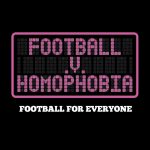
“There are going to be a lot of people like me who are playing and who aren’t out,” he adds. “If they’re not sure about who they are, they might even be questioning their place in the game.
“So we need to get to that point where those who aren’t that confident feel like they can be, that they can be themselves and it doesn’t matter. It works from the ground up – let’s build the foundations from grassroots level.”
Thank you to Zack for speaking on this episode of the Football v Homophobia Podcast. You can find and follow him on Twitter at @zleader12 and on Instagram at @zleader23.
Sports Media LGBT+ is a network, advocacy, and consultancy group that is helping to build a community of LGBTQ+ people and allies in sport. We’re also a digital publisher. Learn more about us here.
We’re interested in your news and stories. Share with us and tap into a worldwide audience through our Google News affiliate website – which pulled in over one million impressions in 2021 – and our popular social channels with over 10,000 followers. Contact us to discuss how we can help you.


